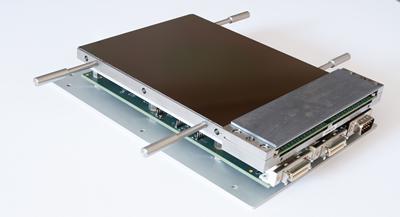vivaMOS-Southampton collaboration focused on new ultra-low noise camera

vivaMOS, a leading developer of image sensors for X-ray applications, will work with the University of Southampton on an innovative deep space imaging project.
Funding from the national SPRINT business support programme will enable vivaMOS to collaborate with imaging experts from the University of Southampton to develop an ultra-low noise camera, suitable for applications in optical astronomy and medical imaging.
This project will build on cutting-edge stitched Complementary Metal Oxide Semiconductor (CMOS) technology for large-area imaging. vivaMOS will collaborate with the Astronomy Group at Southampton which has considerable expertise in the design and construction of optical and X-ray telescope instrumentation, and in low noise detector test and calibration.
The aim of the project is to exploit the low noise and high sensitivity capabilities of the vivaMOS sensor, which are unique in the market. This will enable the development of a large field-of-view camera that can be used in optical astronomy, with further potential opportunities for detectors in the medical field of single-photon emission computerised tomography (SPECT) imaging.
The project will be funded by a grant from the £4.8 million SPRINT (SPace Research and Innovation Network for Technology) programme that provides unprecedented access to university space expertise and facilities. SPRINT helps businesses through the commercial exploitation of space data and technologies.
Dan Cathie, Chief Executive Officer at vivaMOS said: “We’ve been involved in several other projects detecting signals from very low radiation sources. Although these have resolved information to a promising level, they’re not quite there yet. We know the sensor is best-in-class on noise performance and have committed to pursuing it further to see if a product can be developed through this SPRINT ultra-low noise optical astronomy project.
“The University suggested focusing on optical astronomy based on their expertise within the space cluster so we’re confident of getting good support. The results of the project will also feed directly into our product development roadmap for ultra-low dose X-ray imaging.”
Tony Bird, Professor of Astronomy at Southampton added: “To this project with vivaMOS, we bring a background in astronomy, with particular experience in optical astronomy and astronomy detection integration, a focus on software and algorithms, and a strong interest in improving astronomy instruments.
“Local links are very important and it’s great to be working with a local company such as vivaMOS. The field is impactful for our research and with several former Southampton University students now at vivaMOS, it’s also a strong platform from a teaching point of view.”